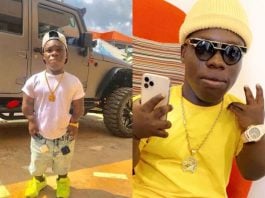Ghanaian socialite Shatta Bandle recently opened up about his affluent background during an interview with Giovanni on The Day Show, where he confidently labeled himself a “Dbee,” a term that signifies wealth and privilege in Ghanaian culture. Shatta Bandle stated unequivocally that he has never known hardship in his life, firmly distancing himself from the typical narratives of struggle often associated with rising social media personalities. Throughout the conversation, he reflected on his upbringing and outlined how his family’s wealth provided him with a comfortable lifestyle devoid of the challenges that many others face.
In discussing his family background, Shatta Bandle sought to clarify some prevalent misconceptions surrounding his father’s profession. Speculations had arisen suggesting that his father was a fetish priest, a common trope that often garners attention in celebrity circles. However, Shatta Bandle firmly stated that his father is, in fact, a Mallam, a respected figure associated with Islamic scholarship. He attributed his family’s substantial wealth to his father’s profession, suggesting that the reverence and position associated with being a Mallam contributed positively to their financial standing. This revelation also served to counteract any negative connotations tied to the misunderstandings about his background.
Shatta Bandle emphasized the importance of authenticity in sharing his story. He insisted that the public often misconceives his narrative, creating a false image of him as someone who has endured hardship and poverty. “When I talk about my wealth, people think I have been poor before,” he remarked, expressing his frustration with the misconceptions that paint his life in a starkly different light. Shatta’s declaration serves as a reminder of the diverse realities that exist within Ghana’s social landscape, challenging the notion that wealth is synonymous with struggle.
Throughout the interview, Shatta Bandle demonstrated a sense of pride in his background, showcasing the benefits that come with belonging to a wealthy family. He stated, “My family is rich; you can ask about me,” reinforcing his assertion that his experiences are not those of struggle but rather of abundance. This pride extends beyond mere financial wealth; it encompasses the cultural and social privileges that come from being part of an affluent family. By defining himself as a “Dbee,” he aligns his identity with success and comfort, suggesting that this is a core part of who he is.
The candid nature of Shatta Bandle’s interview highlights both the complexities of social status and the public’s perception of success in Ghanaian society. His narrative touches on significant themes, including the stigmatization of wealth and the expectations placed on public figures. While many individuals in the entertainment and social media industries might fabricate or exaggerate stories of struggle to resonate with audiences, Shatta Bandle unapologetically embraces his reality. This contrasts with the more common rags-to-riches storylines that often dominate celebrity discourses.
In conclusion, Shatta Bandle’s revelations about his privileged upbringing challenge prevailing narratives surrounding wealth and success in contemporary society. By asserting his identity as a “Dbee” and sharing insights into his family’s background, he offers a refreshing perspective that deviates from the archetypal struggles often celebrated in popular culture. His views remind us that not all stories of success are born from hardship and that the interplay between social status and personal experience is multifaceted. Shatta Bandle’s outspoken nature encourages a more nuanced understanding of wealth, urging individuals to recognize and respect the diverse experiences that shape one’s identity.














